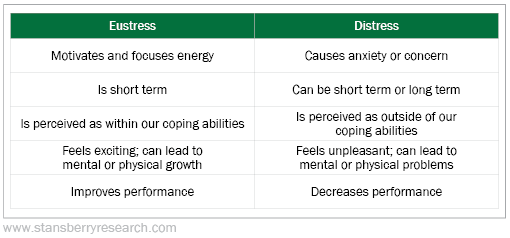"AACK!"
Unless you were born after 2010, you might recall seeing that in the daily comics section of your local newspaper...
That's the trademark shriek of the seemingly perpetually frazzled main character from the Cathy cartoon strip.
Whenever she became stressed about her job, dating life, or diet, Cathy would explode like a dirty bomb of emotions, launching droplets of sweat... alongside her famous, exasperated scream.
Well, she's like most of us... Roughly 90% of American adults feel stressed, according to a survey last year from the American Psychological Association.
But if "AACK!" is your personal anthem nearly every day, that can become poisonous...
Over time, continuous stress is linked to psychological problems like depression, anxiety, and substance abuse... as well as physical ailments like high blood pressure, cardiovascular disease, Type 2 diabetes, and obesity.
But here's what you might not realize...
Not all stress is bad.
One type of stress also helps you grow and keeps you excited about what life has to offer...
I'm talking about eustress.
The "eu" part means "good" in Greek, so the word translates to "good stress."
This stress benefits us. We tend to experience it when something exciting happens – whether it's overcoming challenges, striving toward goals, exercising, or trying something new.
The other type of stress is the bad kind... distress. That's the one that can lead to the bevy of health problems we just went over.
For example, if you lose your job, distress is a natural reaction. "How will I pay my bills? Does losing my job reflect on my value as a person? How long will it take me to find another one?"
You can use eustress to reframe things in your mind. Perhaps instead of distressing about losing your job, eustress can help you see an opportunity to finally apply for a job you've always wanted but never had the guts to go after.
Here's a side-by-side look at both kinds of stress...

It should come as no surprise that scientists have found a positive correlation between a person's eustress and their life satisfaction and well-being. In other words, if eustress increases, so too does your happiness and health.
Luckily, we've got a simple but powerful tool at our disposal to transform distress into eustress...
That tool is called mindfulness.
Basically, it's just noticing – and being curious about – what's happening to you right this moment. You're aware of what's going on inside and around you. It's often part of meditation.
If that sounds like nonsense, well, medical researchers are fully on board with the power of mindfulness. Studies have shown it can...
- Make you physically healthier in general
- Help manage pain
- Help treat smoking and substance misuse
- Lower the likelihood of relapse in those suffering from major depression
- Decrease depression, anxiety, and, of course, stress
The key is to not judge whatever emotions are running through you. You're simply noticing what's going through your head and not reacting. In other words, you're directing your attention to and accepting what's happening in the present – like your breathing and feelings running through you.
Mindfulness means that when you're faced with a stressor, you can have more flexibility and creativity with coping strategies so you feel more in control of the situation.
The end result? You have more mental toughness during stressful instances. According to a recent study from Stress and Health, the more mindful you are, the more eustress you've got, which equates to greater mental toughness.
Plus, mindfulness meditation can even benefit your immunity. That helps protect you against a major source of holiday stress, one that sidelines you from the festivities with family and friends: getting laid up with the cold or flu.
For example, an eight-week study from the University of Wisconsin School of Medicine and Public Health split nearly 400 participants (ages 30 to 69) into three groups: one that exercised at moderate intensity, another that did mindfulness meditation, and a control group that did neither.
Researchers found that the mindfulness-meditation training and exercise groups had lower rates of colds and flu than the control group. What's more, the mindfulness group even edged out the exercise group with slightly fewer sickness-related missed workdays and fewer episodes of sickness.
Now, if you're balking at the idea of carving out a 20-minute chunk of time in your busy schedule, you're in luck... Studies have shown that even just allotting a few minutes throughout your day works just as well.
So you don't have to feel like a cloistered monk. Based on an October 2020 study, even practicing meditation in four five-minute spurts works just as well as four 20-minute practices to improve depression, anxiety, and stress.
And if you're really strapped for time, even "micropractice" can help...
An April 2024 study of 135 college students had participants close their eyes, observe their bodies' sensations as they recalled a recent stressor, place one hand over the heart and the other over the belly, envision giving themselves a hug, and ask themselves, "How can I be a friend to myself in this moment?"
This "self-compassionate touch" took just 20 seconds per day. Compared with a control group that just tapped a finger for those 20 seconds, folks who regularly practiced compassionate touch reported the biggest decline in stress, depression, and anxiety.
For one of my favorite, quick mindfulness methods, check out last month's issue of Retirement Millionaire right here. (Not a subscriber? Check it out risk-free for 30 days right here.)
What We're Reading...
- Something different: Italy's park of monsters.
Here's to our health, wealth, and a great retirement,
Dr. David Eifrig and the Health & Wealth Bulletin Research Team
January 9, 2025
